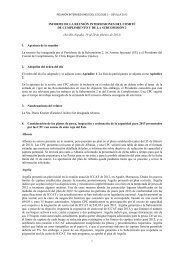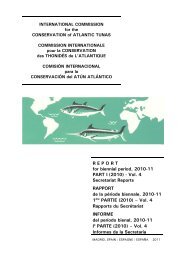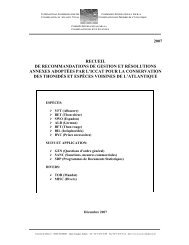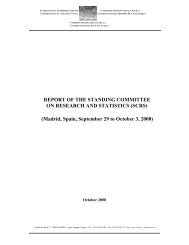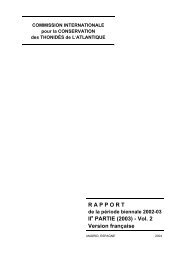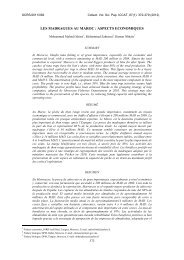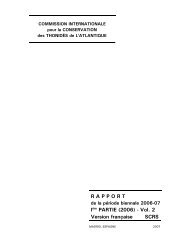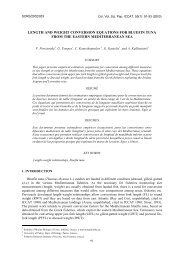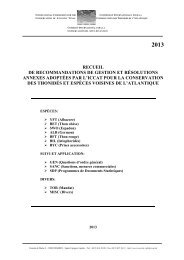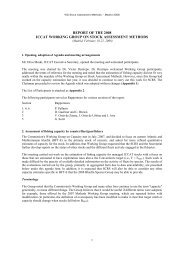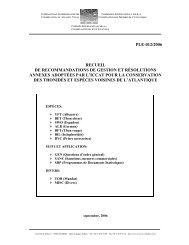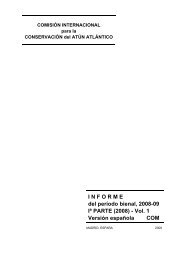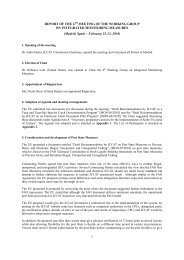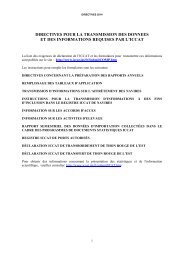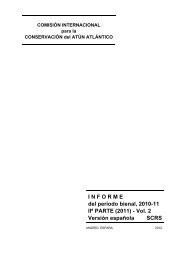E - Iccat
E - Iccat
E - Iccat
You also want an ePaper? Increase the reach of your titles
YUMPU automatically turns print PDFs into web optimized ePapers that Google loves.
ADDRESSES & STATEMENTS<br />
budget envelope. Accordingly, the proposed project will not place any burden on the t-RFMOs or their<br />
budgets.<br />
• In cases where the t-RFMO provides management oversight to specific project activities there is scope for<br />
reasonable re-imbursement within the overall budget envelope of the project.<br />
FAO is currently the lead UN agency with competency in fisheries and aquaculture. The project brings<br />
incremental funds to the work of t-RFMOs and works through existing t-RFMO processes. We believe this<br />
project will benefit both the project partners and make a significant contribution towards more effective<br />
management of tuna resources globally: achieving these objectives requires all the key players to be onboard.<br />
This project is an opportunity that the FAO Secretariat believes should not be foregone.<br />
3.5 OPENING STATEMENTS BY OBSERVERS FROM NON-GOVERNMENTAL ORGANIZATIONS<br />
International Game Fish Association (IGFA)<br />
The International Game Fish Association (IGFA) is a non-profit organization that represents recreational anglers<br />
throughout the world. IGFA was established in 1939, has active members in over 100 countries, is the governing<br />
body for international recreational fishing, and provides rules for ethical angling practices. Many of IGFA’s<br />
members target the highly migratory species managed by ICCAT, especially marlin, sailfish and spearfish (i.e.,<br />
billfish) which are primarily caught and released.<br />
IGFA has great concern about how highly migratory species are being managed on a global level for recreational<br />
anglers. The lack of data and accurate reporting on billfish catch is of particular concern. As an organization that<br />
is committed to the conservation of game fishes, IGFA has deployed 41 pop-up satellite archival tags in marlin<br />
around the world in the last year, 13 of which have been in waters under this organization’s purview. The<br />
information gained from this exercise is available to your scientific committee.<br />
The following are IGFA’s recommendations for the 18th Special Meeting of the International Commission for<br />
the Conservation of Atlantic Tunas to be held in Agadir Morocco on November 12-19, 2012<br />
Billfish<br />
The most recent stock assessments for blue marlin, white marlin, and eastern Atlantic sailfish indicate that all<br />
three stocks are currently still overfished with overfishing occurring in blue marlin and eastern Atlantic sailfish.<br />
Catch data for all billfish species continues to be a problem, as does historic and current misidentification<br />
between white marlin and roundscale spearfish.<br />
• IGFA recommends greater protection for sailfish and blue and white marlin by enhancing data collection.<br />
• IGFA further recommends implementing a prohibition on Atlantic billfish entering into international<br />
trade. Similar legislation has recently been passed, at the request of IGFA, in the United States that now<br />
bans importation of marlin, sailfish and spearfish into the continental United States.<br />
• We also recommend all countries be required to report dead discards and use circle hooks in their longline<br />
fisheries.<br />
Bluefin tuna<br />
Bluefin tuna TAC levels for both eastern and western bluefin tuna should not exceed the recommendations put<br />
forward by the SCRS.<br />
• A recent SCRS report showed that total catch of eastern Atlantic bluefin has been as much as 77% above<br />
quota indicating the high prevalence of IUU fishing. As such IGFA agrees with the SCRS<br />
recommendation that the eastern stock should not be increased until stock assessment models incorporate<br />
more accurate catch data.<br />
• The great uncertainties in the stock assessment for the western stock make it improbable that the stock<br />
will rebuild by the agreed on timeline. Particularly troubling are recent data that indicate that 72% of<br />
bluefin tuna caught off of the U.S. states of North Carolina and Virginia in 2011-2012 were of eastern<br />
origin, which may greatly overestimate the true population size of the western stock. Therefore, IGFA<br />
does not support increasing the western TAC from the current level of 1,750 t.<br />
57



